A finalist in three categories (Seumas McNally Grand Prize, Excellence in Visual Art and Excellence in Audio, with the amount of nominations shared only with Closure and Trauma) in this year’s IGF competition, Ratloop Asia’s Rocketbirds: Revolution! is looking to be the early bird that catches the worm this year.
At the end of its animated intro, “OBEY” reads imprinted in upper-case on the sides of two massive missiles standing upright, shining and erect, at once establishing a poignant scene of the promulgation of violence and power.
- Obey
- Hardboiled
- A rocket and a bird
In retrospect, the aforementioned scene is rather astonishing given the game’s relatively humble origins in a ghastly, ghastly Flash flick, Albatropolis, that has quietly morphed into a vivid, mature work by the Asiatic offshoot of Ratloop, developers of the fascinating drawing game and 2009 IGF competitor Mightier, and Malice, the relatively well-known total conversion for the original Quake.
Rocketbirds, then, headlines the “Original *beep* of War,” a commando-cock called Hardboiled, on a mission to rid the world of the evil penguin dictator Putzki in a Flashback-tinged action-platformer realized in Adobe Flash. Due to circumstance, Hardboiled finds himself sandwiched in a battle between an underground resistance and Putzki’s totalitarian regime.
Putzki has, at his command, an endless swar… err, rookery of penguin mooks in addition to his distinctly (in my mind, anyway) Austrian albatross muscle, Brno [sic]. The game’s primary developers, Tan Sian Yue, James Anderson and Teck Lee Tan, have intriguingly utilized here an anthropomorphic cast of birds much in the vein of, say, Petersen’s Mouse Guard, where strife in the animal kingdom is represented in humanized scope and style. In Albatropolis, budgerigars figure as downtrodden, sidelined protestors; cardinals form the underground movement, and penguins, of course, have become goofy military overlords(!).
Hardboiled – the ma… cock of action that he is – runs, jumps, ducks, rolls, hangs and blasts his way towards Putzki. Now, before I venture any further, I should make it explicit that I consider the controls of Flashback to be the very pinnacle of the genre, and Rocketbirds, to give credit where credit is due, comes much closer to achieving comparable motion than any other game that I have had the pleasure of playing over the past years.
- Subway
- Cityscape
- Atmosphere
My personal affinity for Flashback, Blizzard’s Blackthorne, Yahtzee’s 1213 and Eric Chahi’s diamond-in-the-rough Another World certainly came in handy in approaching the game, and I should think one prerequisite for appreciating Rocketbirds to its fullest is therefore a willingness to abandon expectations of one-button shooting, fast-forward progress and hand-holding. Don’t get me wrong, though – a very thorough set of instructions on the controls is included, for instance.
But what is it, exactly, that ultimately separates this particular flavour of action-platforming from other shooters and platforming games? Perhaps a common characteristic in the aforementioned can be found in their shared treatment of motion: Where other games offer freedom as a trade-off for precision, these do the very opposite, with snap, rigidity and restraint. The underlying control-related constraints, then, erase imprecisions, awarding the player with admittedly a stricter learning curve but also further fluidity and the potential execution of extremely complex movements in a precise manner. What ostensibly should figure as limitation actually becomes liberating.
Like Rocketbirds, these games also utilize two important methods: First, level design based on the one-screen unit, which effectively turns all locations to puzzles of varying difficulty and type. Second, the cunning technique of blatant, tangible exposition of objectives and goals, with progress and reward always looming around the very next corner, and victory right at your fingertips. You’ll fail, quit, restart, knowing full well the futility and the inevitability of your return and retry. This is potent, arcade-style design, surely a factor in the success of Jordan Mechner’s original Prince of Persia, for instance. Good thing Rocketbirds saves your progress into an online account, too.
That being said, the game is not particularly difficult, and serves the player simple but devious physics-based stacking puzzles as breaks in the action, adding important atmospheric flavour and balancing the flow between action and exploration. While I have seen others react negatively to them, I thought they worked very well to underline the quieter moments of the game. After all, the game’s bleak military dystopia is presented in vivacious, hand-painted art instead of vector-based artwork beyond the cutscenes detailed above.
In fact, I seldom cover Flash games due to my slight disdain for motion tween –based animation, but here, the graphics of Rocketbirds look pleasantly hand-crafted, and especially the animations are fluid, full of character and often absolutely hilarious. Hardboiled walks with a toughman’s gait, the penguin mooks wobble on, and special actions have their own curious touches. At times, the game benefits from the elasticity of Flash: Unlike with pixel-based artwork, sometimes the camera’s viewpoint zooms very close to the action only to pan far away elsewhere.
The hand-painted backgrounds consist of a thorough array of locations straight from action and espionage film. The game features, overall, nine levels of slightly varying length; among others, a prison, an airfield, and a subway. The subway, a prevalent location found both in Flashback and 1213, nevertheless manages to stay relevant: I literally gasped for air when I realized what I was being asked of, and then more – even if the developers do eventually go all in with the crates, you’ll ultimately be amused rather than frustrated.
This is, perhaps, a lesson learned from Valve: Half-Life 2’s tunnel of light remains the landmark example of balancing flow with feedback in order to create a sensation of success and accomplishment after a hard-fought, prolonged battle (for the surface, in that case). In fact, like Half-Life 2, Rocketbirds manages to switch gears constantly, tackling mature themes and even incorporating questions of duty, morality, reason and even fear: An important mechanism in the game allows you to position the guards’ own weapons on their temple, forcing them to pull the trigger, for instance.
By far the most intriguing element of the game to me is its written dialogue, as the lonely monologues and conversations of the enemy guards are chock full of character and emotion:
- The odds are stacked
- Far away
- Penguins go home!
Surprising depth can also be found in the game’s utilization of music. While the ambient soundscapes and –effects are very neat, often working to enhance the scenario at hand, major scenes feature songs from the band New World Revolution in a seldom-seen coupling of pop music and animation that actually gives the game some further character – as if any more were required for a game of such thematic eccentricity!
A minor blemish on an otherwise spotless record for the game remains: On my temporary fallback computer (an AMD64 3000+), the game borders on unplayable especially during its latter levels. Whatever settings I touched would have very little effect on the game’s performance - an issue I believe is Flash-related. It’s not that the game becomes unsmooth or laggy, but rather unresponsive; it would often take two, three, even four button presses to elicit an action, like switch to the inventory, in a busy sequence.
Full-fledged combat situations therefore became, if not impossible, far more intolerable than they were envisioned to be: I found myself inching onwards, perhaps with too much perseverance: On a different set-up, a Macbook Pro, the game ran smooth as butter and I was able to get through whichever parts I was stuck at effortlessly. This is no more than a heads-up to those with lower-end machines. Ratloop Asia have in fact also produced a downloadable launcher both for Mac and PC that allows you to play the game full-screen and free of annoying browser dependence.
The argument can also be made that the game never quite takes the ball, character-wise, and runs with it, but as the first episode of a potential series - added with the presence of the Albatropolis Flash still looming over the series - I thought restraint seemed to be, at this juncture, the right choice. At the end of the day, all that really matters is that right now, Rocketbirds: Revolution! is the next-best thing you’ll have to Flashback - a coherent work with crisp controls and stylish, cinematic wrapping.
A demo is available right now, from www.rocketbirds.com, and the full game can be bought, from Ratloop Asia, for the price of $9.95.

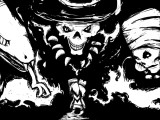
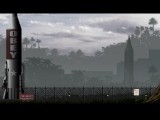
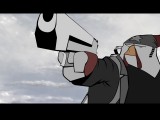
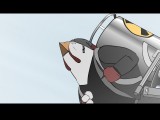

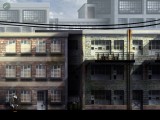
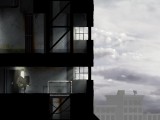



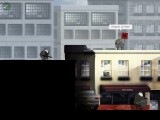
Share